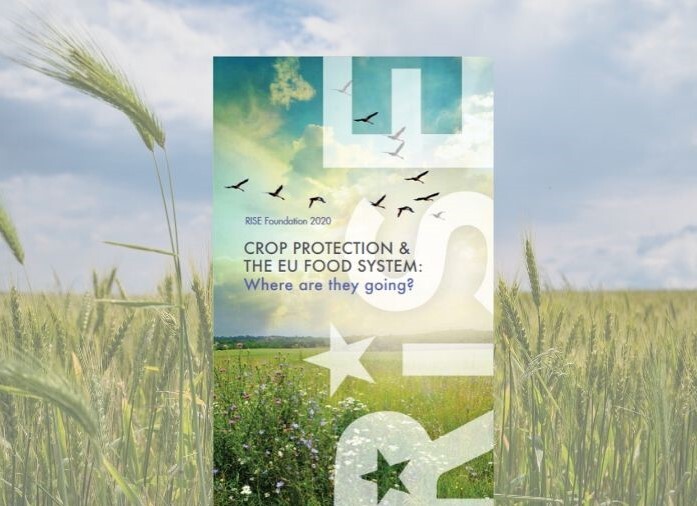
RISE is an independent public utility foundation. Their mission is to envisage and promote a more sustainable agricultural system in Europe; one that engages fully with the circular economy, provides safe and healthy food whilst developing our natural capital. It creates jobs and encourages investment in rural areas, and conserves our traditions and cultural heritage.
RISE works as a think tank, bringing together experts to address key environmental/ agricultural challenges in Europe and develops high quality accessible research reports with clear recommendations for policymakers.
As an independent non-profit organization, RISE holds a rare position in that it can provide policymakers with entirely impartial and accessible evidence-based opinions and recommendations on key policy developments and agricultural challenges of the day.
Crop protection
The way crop protection is conducted today is considered unsustainable by many stakeholders. ‘Change must come,’ says RISE’s Chairman Janez Potocnik, the former EU Commissioner for Science and Research and for the Environment. A system change is required that would restore natural protection and resilience. A study was set up on how to make such a transition work and to provide policy recommendations for it. This study is supported by a number of organizations of which Koppert is the only one with a focus on biocontrol and bioprotectant technologies.
The outcome of this science-based study is reflected in a report that will be presented on April 20 to policymakers. It will also be circulated to more than 10,000 stakeholders in the agriculture and environment sphere, and in the media. It will also be presented to key politicians in the EU before the launch. This report will be an important one, amongst many others, to discuss that a change is needed in agriculture and crop protection. Not just in agriculture, but also in areas that have a strong influence on land use, the crops grown and their purposes, and human food habits. Changes are also occurring in these fields and need to happen in order to have a healthy human population and keep the planet in balance. The extensive report addresses the following issues in five chapters:
- The concerns around crop protection
- An examination on how the legislation functions
- Why change is unavoidable
- A description of ways to go through a transitional development path
- Policy recommendations
The key question that is addressed is whether we can continue with the crop protection system that we have today, or whether there is a need to change the current production system? The answer is evident that the current system is not sustainable and that a new food production system has to be developed. The report concludes that a new goal for crop protection should follow: to re-establish ecosystem functions on agricultural land to provide nature-based solutions for pest, disease and weed threats, and to utilise all means to enable a substantial fall in the harm caused to health and environment by the use of PPPs.
This requires a transition strategy that needs to be based on five elements:
- Encourage the adoption of sustainable farming principles and practices, and restore ecosystem functions.
- Drive Integrated Pest Management as the coordinating framework.
- Encourage biocontrol where possible.
- Deploy precision agriculture, robotics, artificial intelligence and big data where appropriate.
- Internalise pest and disease resistance through breeding.
Koppert Biological Systems in particular underlines the development of appropriate IPM programmes for each cropping system, even for each farmer, where knowledge and measures emphasize the prevention of pest and diseases, using biocontrol tools to intervene when necessary. These bioprotectants safeguard the ecosystem services in the crops, soil and surroundings and maintain the balance and resilience as much as possible. New technologies can assist this system and optimize timing of actions.
‘A new paradigm needs to come into place where IPM (integrated pest management), INM (integrated Nutrient management), and ITM (integrated technology management) will lead us to ICM (integrated crop management). Biological solutions will be the driving force for sustainable and healthy food production systems. The European regulatory framework needs to be adapted to this new area. As Koppert we aim to contribute to the health of the people and the planet, to make agriculture healthier, safer and more productive,’ states Peter Maes, Corporate Marketing Director at Koppert.
Many policy measures are needed for such a transition to be adopted and be successful over time. Engagement of the many stakeholders needs to be achieved and new policies adjusted to reach this transition. Regulatory innovations will be required as well as research into new methods and tools. A list of policy recommendations which should be implemented in the EU New Green Deal and Farm to Fork Strategy to create this new agricultural system for the next decades has been proposed.
Dr Willem Ravensberg, Koppert’s Corporate Sr Governmental and Regulatory Affairs Manager and former President of the International Biocontrol Manufacturers Association (IBMA): ‘While current crop protection methods are recognized as not sustainable, IPM and biocontrol can offer the natural solutions for a new sustainable crop protection system that respects human safety, the environment and biodiversity whilst helping to safeguard our people and the planet.’
The full report will be available on May 19th with the title: Crop Protection & the EU Food System: where are they going? The launch event will take place through an online webinar, accessible by invitation only. If you are interested in attending, do not hesitate to contact Rise Foundation. After the launch event, the report and the recording of the webinar will be made available online.